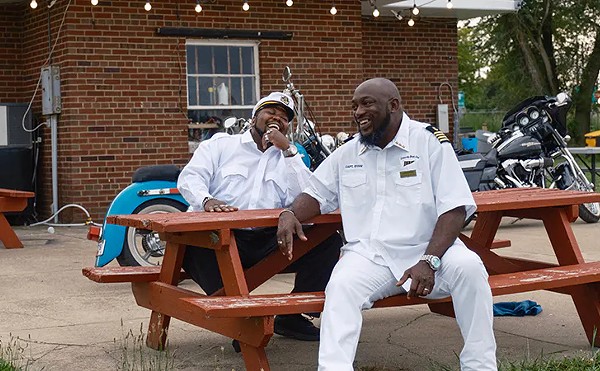Wong's home life bloomed as well. Her daughter made the junior-varsity tennis squad. Her son was driving on a learner's permit. Business thrived at husband Kam's pharmacy in Saint Luke's Medical Center. Her 80-year-old mother was still giving orders to drink herbal soup.
Where her practice was concerned, the letter of holiday greetings Wong penned in December 2000 struck a less festive tone. Immigration law, the letter noted, was becoming increasingly complex and difficult. Also, three attorneys had recently bolted the firm. Yet friends and acquaintances were assured that no challenge was too great for Margaret Wong & Associates. "My colleagues, staff members, and I recognize this as an opportunity to regroup and reaffirm our commitment to be the best in the immigration arena," she wrote.
Wong's reputed excellence -- she refers to herself as a wonderful lawyer -- would be dealt a blow two years later, however, when The Plain Dealer published accusations of racism.
The accusations came to light after Kathleen Ehrbar, a paralegal who had been fired, sued Wong, claiming race and age discrimination. In sworn depositions and affidavits, former employees described Wong, who was born in Hong Kong, as a fount of prejudice.
Said Dee Preston, a former secretary: "I believe that Margaret Wong is a racist, and that she prefers to work with Asians over non-Asians, and she prefers white employees over black employees."
Anikó Kálnoki, an attorney formerly associated with the firm: "On numerous occasions, she had indicated that Caucasians are not smart and they are slow; Asians are fast, Asians are smart."
Marian Vasquez, a former paralegal: "Margaret Wong said to me, 'Will you see these clients for me? I don't want to see them; they're Jewish."
Michael Sharon, another attorney and former associate: "[S]he would make statements that were not flattering, about people of Indian ancestry, Arabic clients, African clients, Hispanic clients."
Ehrbar's suit was settled. A $50,000 offer was made and accepted, documents show, although the final agreement is confidential. Today, Wong denies that she is prejudiced. "I never was, and I never will be, and I never am," she says. "I want to help everybody. I was given such a great opportunity. Why shouldn't everybody be?"
The complaints lodged against Wong do not end at cultural insensitivity, however. In September, a former attorney who is blind filed a lawsuit accusing Wong of discrimination based on her disability. The suit alleges that Wong failed to make accommodations for the attorney, Michele Norton. The suit claims further that Wong humiliated Norton, in one instance comparing her to a dog. Wong denies the allegations.
At the least, Wong is sometimes a poor judge of how her words and actions will be received. A survey she sent to fellow immigration attorneys asks their political party affiliation, their income, which colleges their children attend, and whether they've been divorced. A Christmastime memo instructed employees that spending money is not happiness, yet she lives in a $961,000 Shaker Heights home that's equipped with an indoor swimming pool.
Thoughtlessness is not unique among people of success, especially self-made successes. Wong can remember a time when she was a trembling lawyer and not even obscure government agencies would hire her. "Everything I got, I got on my own," she says. But Wong's critics say that her fame and fortune were amassed at others' expense. "She takes advantage of her customers," says Chor-Bishop Bernard Khachan at St. Maron's Maronite Catholic Church in downtown Cleveland.
On the surface, her story is inspiring. Beneath that, a more infuriating image emerges.
Margaret Wong was born in 1950. Her father was a publisher of some prominence. Still, for her, a university education in Hong Kong was inaccessible. At age 19, she and a sister, Cecelia, left for America and landed squarely in the middle, at a small Catholic college in Iowa. Margaret pursued a law degree at the State University of New York at Buffalo.
Opportunities for foreign-born women did not abound at the time Wong was licensed to practice. After a few uncertain years, she moved to Cleveland in 1978 and worked at Berger & Kirschenbaum, where personal-injury and Social Security work were the house specialties. Old Man Berger was a yeller. He used to tell Wong she had no balls and would never have balls. She quit after a year.
Unwilling to wait for an enlightened firm to hire her, Wong struck out on her own. She rented an office in the since-demolished Williamson Building for $125 a month. Her desk cost $25. She did a little of everything -- divorce, wills, title transfer, rides to the airport -- for whatever clients she could find.
A naturalized citizen herself, Wong staked a place in immigration, and her success soon commanded attention. By 1984, she was a Cleveland YMCA woman of achievement, a Glamour magazine outstanding young working woman, and a restaurateur (she founded Pearl of the Orient, which her younger siblings operate). She remains active in the community, lending her name and time to all manner of prestigious boards. The civic leadership section of her online biography is 271 words long. She is like a plant stretching for the sun.
Business has kept pace with Wong's schedule of engagements. Her firm opened offices in Columbus and Detroit. John Martinski, the president of an IT company in Columbus, has relied on Wong on dozens of occasions in the last 12 years. He says he wouldn't consider using anyone else. "She's been a great provider of immigration work," he says. "We've never had anything not go our way."
Carrying two cell phones and often reaching her desk before 6 a.m., Wong is not shy about crediting herself for her success. "You never hear Margaret Wong is not the greatest lawyer in the world," she says. "That's how good I am. It's in here -- and I tell my kids this -- it's in my mind, in my brain, in my heart, and in my gut. It's there. I see a case and I know what to do -- that's how good I am."
Wong has excelled in what is not the law's most glamorous field. There are few Perry Mason moments, no multimillion-dollar judgments. The work is technical, similar in routine to family medicine or auto mechanics -- diagnose, repair. It's also a volume business. Since 1998, Margaret Wong & Associates has taken on 12,000 new matters. The firm employs between 30 and 40 people at any given time. At the moment, six (counting Wong) are attorneys. The rest are paralegals, accountants, secretaries, and other support personnel.
One recent morning, Wong led a tour of her firm, which occupies a building on Chester Avenue owned by a family trust. Space abounds. Rooms are reserved for exercise and quiet meditation. Wong plans for a sizable corner to double as a Chinese-American meeting hall. The youth and color wheel of skin tones among the workforce suggest a drop-in center for international college students.
Throughout the tour, Wong introduced the visiting reporter as her "friend" -- though the interview was of such a nature that it had to be arranged through and attended by her attorney -- and as a "fellow journalist," a reference presumably to her father's profession and her consideration, at one time, of a career as a reporter. Inappropriate introductions are supposedly a habit of Wong's. Tracy Harves, a lawyer who sued the firm in 1998 after a dispute over maternity leave, complained that Wong referred to her in front of clients as the "knocked-up attorney." (Wong denied this.)
Harves worked at Margaret Wong & Associates not quite a year. Short stints at the firm are common. A document in Ehrbar's case file lists the dates of service for some 100 employees. According to the document, of 32 associate attorneys hired in an 11-year period, 17 lasted less than a year. Patrick McLaughlin, Wong's attorney, attributes the turnover to the wider trend of fluidity in the workplace and the narrow focus of the practice. "Anybody who wants to do something besides immigration is not going to do it here," he says.
But departed attorneys have said that their former boss, in addition to disparaging seemingly all ethnicities but her own, flashed a beastly temper. "If she got upset about something, she just snapped," former Wong attorney Harlan Karp said in a deposition he gave in the Ehrbar case. Karp said Wong would apologize later for her outbursts, which she called "one of her weaknesses," according to his deposition. A Wong alum who spoke to Scene on the condition of anonymity compared the tongue-lashings and subsequent apologies to what a battered wife endures.
Wong concedes that she can be a taskmaster, but she points to excellent benefits and company trips to Cancùn and Jamaica as signs of her generosity to employees. "And when they do something good, we'll slip them $100," she says. "Sometimes I just give them cash, because I don't want the office to know, so, you know, 'Here is some extra money.'"
The former attorneys who are critical, Wong notes, are current competitors. She sued three lawyers who left en masse in 2000 and started their own firm. Her suit claimed that they stole her client lists and "breached their duty of loyalty" by placing their interests ahead of hers. "Some of these people just came back and bit me," she says. "But it's okay -- no negativity, because I want them to succeed. Because if they succeed, I'm succeeding in my mentoring."
Still, similarities in the complaints made against Wong suggest that more than ingratitude is at work.
Michele Norton thrives in a world she can barely see. She suffers from congenital nystagmus, a condition marked by rapid and involuntary eye movement. In typical nystagmus cases, "dancing eyes," as they're sometimes called, do not allow for light rays to focus correctly on the retina. Norton has about 20 percent of her vision and a visual field of two feet, according to court documents. Despite her disability, she graduated magna cum laude from Edinboro University in Pennsylvania. After attending law school at Case Western Reserve, she passed the bar exam on the first attempt.
Prior to taking the bar, Norton worked as a paralegal at Margaret Wong & Associates. According to the suit, Norton told Wong at the time she was hired that she needed certain accommodations; she took longer than a sighted person to complete some assignments. The suit alleges that Wong agreed to make the accommodations -- and remarked that Norton's visual impairment offered certain advantages. "She commented that having Ms. Norton at the Defendant law firm would make her (Mrs. Wong) look good," the suit says. "She said she could also use Ms. Norton's vision problem to gain sympathy and sway individuals."
But the suit goes on to claim that Norton was discriminated against and harassed by Wong and others at the firm because of her disability as well as her race (white) and national origin (U.S.A.). The suit describes screaming sessions and tears. "At one point while she was berating Ms. Norton, Defendant Wong angrily stated, 'Even my dog knows when to walk away and not keep talking.'"
Norton was fired on March 31, 2003. That day, the suit claims, Wong rushed into Norton's office and berated her for filing a corporate client's petition for an individual alien who owed the firm money from another matter. The suit says also that Norton had renewed requests for "certain reasonable accommodations" a few days before she was terminated.
Shortly after Norton's firing, the suit alleges, someone from the firm approached her and suggested that she could come back to work. When Norton said she wanted to speak with an attorney, the offer was withdrawn, the suit says.
Later, Norton's attorney informed the firm that a lawsuit would be filed. The suit suggests that Wong reacted angrily. Norton alleges that Wong contacted her current employer, also an immigration lawyer, telling her new boss to "watch out" and asking whether the employer could persuade Norton to settle the suit.
In an answer to Norton's complaint, Wong denies that accommodations were requested, let alone denied; that Wong said Norton's blindness would show well on the firm; that Norton was harassed or discriminated against; that Wong compared her to a dog. Wong admits that Norton was "informed" that she should not have filed a petition for an alien who owed the firm money and that Norton requested and was provided with "clerical help" shortly before her firing. But Wong denies approaching Norton's current employer after Norton spurned an offer to return.
What may be most interesting about the Norton complaint is the way it echoes an earlier dispute between Wong and Tracy Harves, the attorney Wong allegedly called "knocked-up."
Harves learned she was pregnant soon after she joined the firm. She gave birth five weeks prematurely and was slow to recover. Harves sought more than two months' paid maternity leave. Her pay stopped after two-and-a-half weeks. Her lawsuit claimed that Wong had said previously that she would pay whatever maternity leave Harves needed. Wong denied making such a promise and said that Harves was insubordinate upon her return to work.
The Harves and Norton cases are similar, in that both women claimed that Wong defined them by their characteristics. Just as Wong supposedly referred to Harves as "knocked-up," she supposedly introduced Norton to clients and colleagues as "legally blind." But aside from impolitely announcing their reproductive state and visual impairment, Wong was alleged by both women to have suggested that their conditions could be used to win preference. In her suit, Harves claimed that Wong told her to tell government officials that her pregnancy affected her judgment, "in an attempt to obtain a more favorable outcome for a client." The suit also claimed that Wong asked Harves whether she could have a cesarean section, around which to plan her time away from work.
Wong denied Harves's allegations, though the court record shows that she eventually settled with Harves for $45,000.
By virtue of her success and professional longevity, Margaret Wong casts a long shadow over the local immigration trade. "Most of the lawyers in town have a history with me," she says. "Most of the lawyers, they either have looked for a job with us and we won't hire them, or they have shadowed me, or they talked to me.
"They know my mode of practice. They know how much we charge. They're perpetually undercutting me and saying, 'Oh, she's too expensive.' I can tell you stories. I mean, every client who walks in here, they'll say, 'So and so said, "You're gouging fees." So and so said, "You're unethical." So and so . . . ' I know what people say."
Lawyers who have worked for Wong do say those things, though none would speak to Scene on the record. A few have spoken while under a court order. Michael Sharon, an attorney who worked for Wong for 16 years, was asked in a deposition if Wong ever asked him to do anything that he believed was unethical. Yes, he said. "For example, she would ask to charge additional fees to clients above and beyond what was originally quoted," he said. Sharon was asked whether Wong explained why additional fees should be charged. He said that he was told do so, in some instances, when cases had been successfully litigated. And "sometimes she said they can afford it."
Indeed, Wong makes a point to meet her firm's many clients. One reason, former attorneys say, is that it allows her to gauge their wealth (an uncalloused handshake, for instance, signals a white-collar professional) and set fees accordingly.
Even before Wong greets clients, the balance of power tilts in her favor. Prospective clients can be made to wait hours for the great Margaret Wong. The wait puts a thought in clients' heads: "Ah, she must be successful." One former client says he waited an hour for a five-minute meeting with Wong at her Columbus office. The client, who asked that his name not be used, says he sat on the floor because the lobby lacked furniture. He says the meeting ended abruptly, because Wong said he annoyed her by asking too many questions.
Another former Wong attorney, Anikó Kálnoki, was also made squeamish by the firm's business practices. Kálnoki said in a deposition that Wong asked her to embellish the facts, to "pad it out," so that clients could make a reasonable claim for, say, asylum.
Sharon and Kálnoki were two of the attorneys who left abruptly and were later sued by Wong. They denied breaking the law or violating ethics canons. In fact, they argued in a counterclaim that, while at the firm, they tolerated "disquieting improprieties," including billing and accounting irregularities, and occasions when they were asked "to take actions which would violate their ethical obligations and may otherwise have been fraudulent or illegal."
Eventually, both sides agreed to drop their claims. The accusation that Wong bills unfairly remains just that: an accusation. She has a clean record with the state Supreme Court's Board of Commissioners on Grievances and Discipline. Of course, of the more than 7,000 grievances filed against Ohio attorneys last year, just 111 resulted in sanctions.
Wong's reputation for being expensive, however, needs no 28-member discipline board for review; it is well established. "Some people say she delivers. Some people say she solved their problems," says Ola Elsaid, the former program director at the Arab-American Community Center for Economic and Social Services. "I've heard the same about other lawyers. The one thing she stands out for is she charges a lot more than others." As an example, a competitor says, Wong may charge $1,000 to seek a work permit when most attorneys would charge only a few hundred. Bills for more elaborate immigration work can reach five figures. Wong's firm sued one former client, a medical doctor, who refused to pay the remaining $2,000 of a $20,000 contract to seek permanent residency and a waiver of the requirement that he return to his home country for two years.
Asked whether she is expensive, Wong employs a retail analogy. "I am not Kmart. I am not Wal-Mart. I am Target," she says.
McLaughlin says that prospective clients can and do shop for they what they perceive to be the best value. "Sometimes the client will decide to pay a little more to an attorney, because they think that attorney has more experience in an area or is liable to be more successful, perhaps," he says.
Invacare, the Elyria medical-supply company, might fit into this category. "Everybody tells me her price is not low, but she's very professional and she knows what's she doing," CEO Malachi Mixon says.
A local woman who retained Wong to represent her brother in a deportation matter says that Wong is not cheap, but neither was the competition she interviewed. "I wasn't concerned that I spent the amount of money that I did, once [Wong] actually got the work done for me," she says.
The woman's brother escaped deportation and now has his green card. The woman, who did not wish to be named, appreciated Wong's optimism and respectfulness throughout the process. "I was totally impressed with the way she communicated with me, even though I'm 25 years old. She treated me as equal, as she would treat anybody 40 years old."
Hugh Wilson, a Jamaican reggae artist, also credits Wong with being accessible and personable. Wilson says that Wong spent hours with him, plotting a course for him to stay in this country, before money was discussed. "She's always ready to do what she can for people," he says. "I would recommend her to anyone and everyone."
Wong suggests that her fees are an issue because the competition is overwhelmed by her colossal reputation. "They cannot say I am not great, because I am great," she says.
But a local church leader with no apparent motive to hurt Wong's business says she takes advantage of the vulnerable. Chor-Bishop Khachan advises the immigrants he knows -- Maronites are Lebanese and Syrian, typically -- to seek counsel from someone other than Wong. "People who come from overseas have nothing," he says. "They work hard to get a few dollars to be able to live. She doesn't have no feelings. She is 100 percent business, and her business is too high. She charges too much."
Khachan adds: "I want to be fair to her. Nobody is asking them to go to see her. Many times I give the names of other lawyers. They wind up [at Wong's office]."
It has been suggested that some clients wind up with Wong because she promotes herself as having pull with authorities. "She would represent to clients that she had some influence with Immigration [and Naturalization Services] to get them to retain the firm," Kálnoki said in deposition. Scene spoke with two former clients of Wong's who support this claim but did not want to be identified. "She said she could get things done," one said.
Wong is at least optimistic. The woman whose brother was nearly deported says she felt initially that Wong "was sugar-coating things, quite honestly." But the service provided did prove to be sweet. "Once she tells you that she's going to get something done, she actually does it for you," the woman says.
Wong does not say that she peddles influence; rather, she says she has knowledge. "I know all of them," she says, speaking of immigration authorities. "I work with them for 30 years. And in the meantime, they all switch, like, you know, State Department people who went from Korea to Mexico to the Philippines. We know them. We know who to call. We know how to get the job done. That's why I'm the best in the country."
At this point, McLaughlin steps in. "Well, hopefully, your experience and the fact that you've done it so many times, and you know people, and you've been there and battled --"
"Absolutely," Wong says.
"-- It serves you well. Yeah, so, that's fine. Next question."
In mailing her prying survey to immigration lawyers, Wong claimed to want to "better understand what makes us immigration lawyers do what we do."
But the lawyer who seems to intrigue Margaret Wong most is Margaret Wong.
"As a fellow immigration lawyer for over twenty-five years now," the cover letter began, "I have seen the triumphs and tribulations of immigration law. As my children prepare to go to off to college, and as a mother over fifty years of age, I begin to reflect what it is that makes immigration attorneys spend long hours away from family and other priorities to continue to practice immigration law in the face of the adversity that is ever-present in our field.
"Each morning when I arrive at the law firm, I wonder to myself what incentives drive me to forge ahead, come to the firm every morning, review new files, and fight for a client's rights so valiantly. Answers to these questions are hard to come by, and so, I would like to enlist your help."
Whatever Wong learned from her survey, she has not shared much to date. Her May newsletter printed only a small portion of the results (4 answers to 39 questions) and gave no indication of how many attorneys responded. It is hard to imagine that a great many would part easily with the personal and proprietary information solicited. One area immigration attorney who received the survey speculates that Wong wanted to learn what lawyers make good money and, therefore, pose a threat. Survey results, the attorney adds, might also serve to boost Wong's ego. Who, after all, can claim more employees than the surveyor?
Indeed, for all her board appointments and free seminars, reciprocity does not appear to be a strong suit of Wong's. As a football coach, she would not be the sort to distribute post-victory game balls to her players. She is proud of a recent case in which her firm argued successfully that a fifth-degree felony charge of drug possession was not grounds for deportation, but in recounting the win, she still manages to belittle a subordinate: "It took me eight years to push one of our lawyers to get it," she says. "It took me eight years . . . If I had better lawyers, I could have done it in two years. Because I know Ohio. When you talk about good lawyers, I'm one of the best in the country."
So good, in fact, that in all these years, she has not found a lawyer worthy of partnership. Wong's initials and Wong's initials alone hang from the facade of the Chester Avenue building. "When the time is right, I will [bring on a partner]," she says. "On my own terms."
But you've been an attorney for a long time. You've never come close? she is asked.
"When I find the right people, I will. When the time comes, I will.
"I'm still one of the best in the world, and I like to hold it at that."











